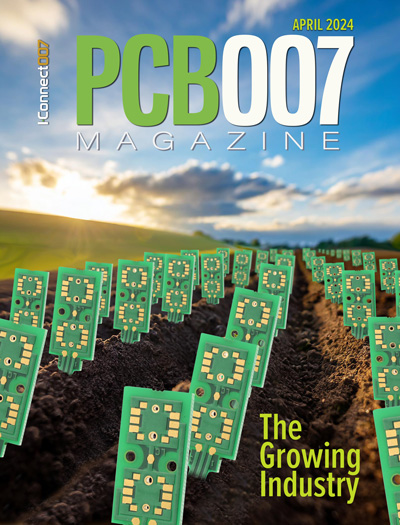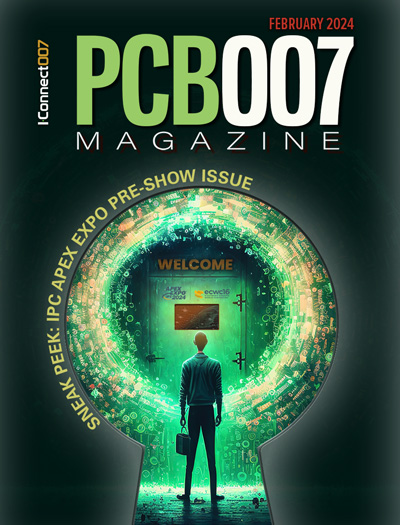-

- News
- Books
Featured Books
- pcb007 Magazine
Latest Issues
Current Issue
The Growing Industry
In this issue of PCB007 Magazine, we talk with leading economic experts, advocacy specialists in Washington, D.C., and PCB company leadership to get a well-rounded picture of what’s happening in the industry today. Don’t miss it.

The Sustainability Issue
Sustainability is one of the most widely used terms in business today, especially for electronics and manufacturing but what does it mean to you? We explore the environmental, business, and economic impacts.

The Fabricator’s Guide to IPC APEX EXPO
This issue previews many of the important events taking place at this year's show and highlights some changes and opportunities. So, buckle up. We are counting down to IPC APEX EXPO 2024.
- Articles
- Columns
Search Console
- Links
- Events
||| MENU - pcb007 Magazine
New IPC Report Details How PCB Makers Address Tech Trends
June 1, 2015 | IPCEstimated reading time: 2 minutes
PCB Technology Trends 2014, a global biennial study published this month by IPC – Association Connecting Electronics Industries, is now available. The survey-based study shows how PCB manufacturers are meeting today’s technology demands and looks at the changes expected by 2019 that will affect PCB fabricators and their suppliers of materials and equipment.
Based on data collected from 158 companies worldwide, the 173-page PCB technology trends study presents the aggregate data segmented by application for five key segments: computers and telecommunications, consumer electronics, industrial and automotive electronics, medical electronics, and military and aerospace electronics.
The study covers such issues as: clock speed, heat dissipation, operation cycles, product life expectancy, environmental operating range, lamination cycles, board thickness, layer counts, line width and spacing, via diameters, aspect ratios, use of embedded technologies, surface-mount land dimensions, I/O pitch, test density, recyclable content, component size, and numbers of leads, solder joints and components per board area.
Among the many interesting findings, the study reports that nearly half of the responding PCB manufacturers for computer and telecommunications applications expect their highest clock speeds in 2019 to exceed 25 gigahertz. This segment had the highest clock speed predictions. The military and aerospace segment reported that heat dissipation is a design-limiting factor in half of their devices currently, which is the highest of the five applications studied, and they expect that percentage to rise in the next four years. More than one-third of responding companies in the military and aerospace segment are currently embedding passive components in their boards. Embedding of passive and active components is expected to increase substantially by 2019 for all five applications studied.
PCB Technology Trends 2014 is available free to companies that participated in the survey. Other companies may purchase the report by visiting IPC’s online store. The price for IPC members is $675 and $1,350 for nonmembers. For more information or to purchase the report, click here.
About IPC
IPC is a global industry association based in Bannockburn, Ill., dedicated to the competitive excellence and financial success of its 3,600 member companies which represent all facets of the electronics industry, including design, printed board manufacturing, electronics assembly and test. As a member-driven organization and leading source for industry standards, training, market research and public policy advocacy, IPC supports programs to meet the needs of an estimated $2 trillion global electronics industry. IPC maintains additional offices in Taos, N.M.; Washington, D.C.; Stockholm, Sweden; Moscow, Russia; Bangalore and New Delhi, India; Bangkok, Thailand; and Qingdao, Shanghai, Shenzhen, Chengdu, Suzhou and Beijing, China.
Suggested Items
Taiyo Circuit Automation Installs New DP3500 into Fuba Printed Circuits, Tunisia
04/25/2024 | Taiyo Circuit AutomationTaiyo Circuit Automation is proud to be partnered with Fuba Printed Circuits, Tunisia part of the OneTech Group of companies, a leading printed circuit board manufacturer based out of Bizerte, Tunisia, on their first installation of Taiyo Circuit Automation DP3500 coater.
Vicor Power Orders Hentec Industries/RPS Automation Pulsar Solderability Testing System
04/24/2024 | Hentec Industries/RPS AutomationHentec Industries/RPS Automation, a leading manufacturer of selective soldering, lead tinning and solderability test equipment, is pleased to announce that Vicor Power has finalized the purchase of a Pulsar solderability testing system.
AIM Solder’s Dillon Zhu to Present on Ultraminiature Soldering at SMTA China East
04/22/2024 | AIMAIM Solder, a leading global manufacturer of solder assembly materials for the electronics industry, is pleased to announce that Dillon Zhu will present on the topic: Ultraminiature Soldering: Techniques, Technologies, and Standards at SMTA China East. This event is being held at the Shanghai World Expo Exhibition & Convention Center from April 24-25.
AIM to Highlight NC259FPA Ultrafine No Clean Solder Paste at SMTA Wisconsin Expo & Tech Forum
04/18/2024 | AIMAIM Solder, a leading global manufacturer of solder assembly materials for the electronics industry, is pleased to announce its participation in the upcoming SMTA Wisconsin Expo & Tech Forum taking place on May 7 at the Four Points by Sheraton | Milwaukee Airport, in Milwaukee, Wisconsin.
Hentec/RPS Publishes an Essential Guide to Selective Soldering Processing Tech Paper
04/17/2024 | Hentec Industries/RPS AutomationHentec Industries/RPS Automation, a leading manufacturer of selective soldering, lead tinning and solderability test equipment, announces that it has published a technical paper describing the critical process parameters that need to be optimized to ensure optimal results and guarantee the utmost in end-product quality.


